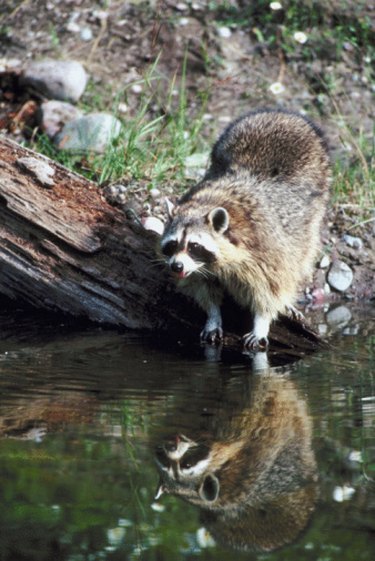
One of the challenges tacitly accepted by every gardener is dealing with the wildlife that covets the plants in the garden. These animals eat, destroy and dig up plants for all manner of reasons, though mostly because gardens present something akin to a free all-you-can-eat buffet to local wildlife. Potted plants pose no exception to this rule, and commonly fall victim to digging animals, including raccoons. Luckily, for gardeners, managing raccoons proves relatively simple.
Raccoon Behavior
Video of the Day
Raccoons live abundantly in rural, suburban and urban areas. They build dens in tree hollows, rocky areas and man-made structures that offer easily accessible shelter, such as attics and garages. Raccoons are opportunistic omnivores that spend a good deal of time rummaging for food. In their rummaging, they commonly upend trash cans, root through dumpsters, tear through compost piles, rip up gardens and root around in potted plants. As nocturnal animals, raccoons take advantage of the cover of night, causing damage while humans sleep.
Video of the Day
Why Raccoons Dig
As omnivores, raccoons eat a huge base of food types, from plants to insects, grubs and small animals. Potted plants represent a food source in and of themselves, though they also hold other attractions for raccoons. Animals such as slugs, snails, insects, birds, amphibians or small mammals that spend time in or around plant pots leave scents raccoons find attractive, since raccoons commonly eat all of these animals. Furthermore, potted plant fertilizers often contain ingredients such as bone meal and fish emulsion, the scents of which attract raccoons.
Managing Raccoons
Removing easy sources of food helps prevent raccoon infestation. Surround gardens and potted plants with metal mesh fences and secure food sources like trash cans and compost piles with locking lids. Placing mesh screens over openings to crawl spaces, attics, garages and covered spaces under porches and decks prevents raccoons from entering these areas and setting up dens. Closing garage doors whenever not in use and securing windows and vents into attics also helps prevent raccoons from nesting around the home. Remember that raccoons dig under fences -- when erecting mesh screens, dig them securely into the ground to fully discourage raccoons.
Exercise caution when attempting to trap and release raccoons far from the home, or when attempting to repel them with flashlights, water guns or noise. When trapped or threatened, raccoons become aggressive and may attack.
More on Raccoons and Potted Plants
As nocturnal animals, raccoons spend the day sleeping and the evening and night searching for food. If feasible, the easiest way to stop raccoons from digging up potted plants entails bringing the plants inside at night, when raccoons become active.
If you successfully manage the presence of raccoons and something still digs up your potted plants, it may another common pest animal, such as squirrels, chipmunks, deer, woodchucks, mice or voles. The most common digging animals, dogs, live in large numbers in any area of human population, as both pets and strays.